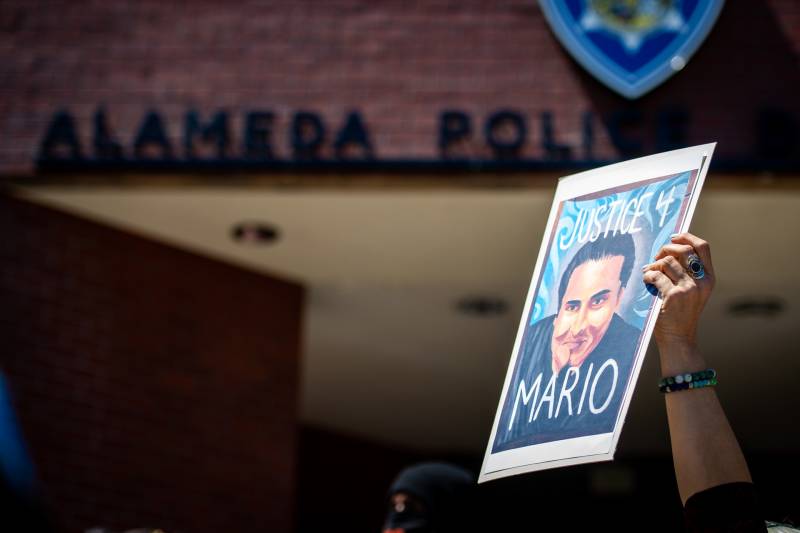Joshi, who became chief shortly after the incident, said he was confident in the justice system and pledged to fully cooperate with the process.
But he also noted that he had conducted his own “independent review” of the multiple previous investigations — including those done by the Alameda County Sheriff’s Office, the Coroner’s Bureau, and the city — and said he “concurred that Alameda police officers did not engage in any misconduct and I stand by that decision today.”
Alison Berry Wilkinson, an attorney who represented the three officers during the previous investigations, blasted the DA’s decision, calling it a blatant act of “political prosecution.”
“The District Attorney waited until the 11th hour before the statute of limitations was set to expire to bring these charges just days after it was confirmed she would face recall,” she said in an email statement. “There is no new evidence.”
Wilkinson defended the officers’ actions while taking Gonzalez into custody as “reasonable, necessary, and lawful” and attributed his death to “drug toxicity, not criminal misconduct.”
“We are confident a jury will see through this charade and exonerate the officers, just as the two prior independent investigations did,” she added.
But Oakland civil rights attorney Michael Haddad praised the DA’s decision to file charges.
“These charges are long overdue. They’re not excessive,” Haddad told KQED on Friday.
“They’re very appropriate and in fact obvious in this situation. I think that from our work in the civil case, we basically gave the district attorney this case tied up in a bow, just from the records we filed in open court,” he said. “And it’s really clear that a jury should decide whether these officers are criminally responsible.”
Gonzalez, a 26-year-old man from Oakland, was confronted by three police officers in a small Alameda park on the morning of April 19, 2021, after several neighbors called 911 reporting a man behaving erratically.
As captured in the nearly hour-long police body camera video, the interaction began calmly but quickly escalated after the officers made repeated, unsuccessful attempts to obtain Gonzalez’s full name and ID. They then grabbed him without ever accusing him of a crime or placing him under arrest. When Gonzalez resisted, the officers took him to the ground, pinning him on his stomach, with at least one of them pressing an elbow and knee into his back and shoulder as he struggled.
The officers continued to hold Gonzalez in a prone position, his hands restrained behind his back, for roughly five minutes, at which point he went limp and appeared to stop breathing.
After officers performed CPR and administered at least two doses of Narcan, a drug used to counteract opiate overdoses, paramedics rushed Gonzalez to Alameda Hospital, where he was pronounced dead.
The incident sparked fierce local protests.
The 2022 review of the case by then-DA Nancy O’Malley’s office found the officers acted reasonably out of concern that Gonzalez might pose a threat to them, himself and others. O’Malley’s office said the officers had tried to “deescalate” the situation by using “necessary” force but never struck Gonzalez or used any illicit chokeholds or weapons.
An autopsy performed by the Alameda County coroner (PDF), and released nearly eight months after the incident, classified Gonzalez’s death as a homicide, but identified the “toxic effects of methamphetamine” as the leading cause of his fatal cardiac arrest. A subsequent independent autopsy, requested by attorneys representing Gonzalez’s family, classified the death as a homicide, attributing it to “restraint asphyxiation.”
Robert Weisberg, law professor and co-director of Stanford University’s Criminal Justice Center, told KQED on Friday it would be a potentially close case.
“These would be difficult jury questions,” Weisberg said. “First if the restraint even played a significant causal role in his death, and second of course whether the officers displayed gross negligence or recklessness in supplying that excessive pressure.”
“I can imagine a judge saying ‘Yes, I think there’s sufficient evidence,’ from which a jury could conclude that there’s a basis for an involuntary manslaughter charge. But it’s very tough to say whether a jury would come to that conclusion.”
Last December, the city of Alameda agreed to pay $11 million to Gonzalez’s 7-year-old son and $350,000 to his mother to settle a civil rights suit.
This story includes reporting from KQED’s Alex Emslie.
